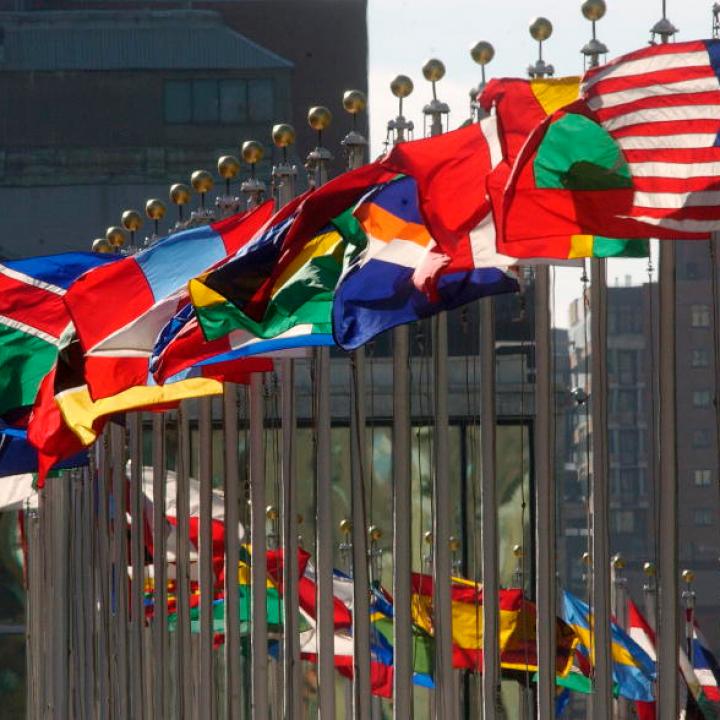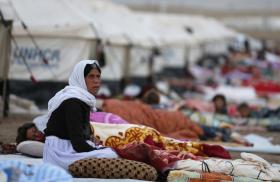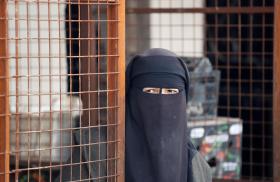
- Policy Analysis
- Policy Forum
The UN's Role in Responding to the Global Terrorist Threat

Part of a series: Counterterrorism Lecture Series
or see Part 1: U.S. Efforts against Terrorism Financing: A View from the Private Sector
Watch a webcast with the head of the UN Counter-Terrorism Committee Executive Directorate as she discusses how the organization is supporting global efforts to prevent and fight extremism amid the coronavirus pandemic.
The following are prepared remarks by Assistant Secretary-General Michele Coninsx, executive director of the UN Counter-Terrorism Committee Executive Directorate (CTED).
Good morning, ladies and gentlemen, allow me to begin by thanking the Washington Institute for Near East Policy for inviting me to speak to you today. I also wish to thank the Institute for its longstanding collaboration with CTED, through our Global Research Network.
This morning, I would like to talk about the role of the United Nations in countering terrorism and countering violent extremism (CVE) and, more particularly, about the role of the office that I lead, the Security Council Counter-Terrorism Committee Executive Directorate. I shall then share some thoughts on the impact of COVID-19 on the current global counter-terrorism and terrorism landscape.
I. THREAT LANDSCAPE
Countering terrorism and violent extremism has always been a complex, transnational challenge. But it is becoming even more complex against the backdrop of an increasingly volatile global security environment. We face a number of diffuse and diverse threats—often accelerated by technology—alongside growing challenges to the principles of multilateralism and international cooperation.
Terrorists and terrorist groups continue to evolve and to adapt their tactics to our counterterrorism responses. Despite the collapse of ISIL’s so-called Caliphate and the death of its leader Abu Bakr al-Baghdadi, in the past eighteen months the threat posed by ISIL continues to be both global and severe. We are increasingly concerned by the threat posed by new or existing ISIL affiliates in parts of Africa—including in the Democratic Republic of the Congo and Mozambique—alongside the potential threats posed by foreign terrorist fighters who have returned or relocated from the conflict zones of the Middle East.
Al-Qaeda and its affiliates are also continuing to exploit conditions conducive to terrorism in a number of states that are suffering from political instability and/or ongoing or unresolved armed conflicts. And we have also seen an increase in large-scale attacks by extreme right-wing terrorists (including in Christchurch, New Zealand, in March 2019; in El Paso, United States, in August 2019; and in the German cities of Halle and Hanau, in October 2019 and February 2020, respectively). CTED highlighted the growing and increasingly transnational threat posed by extreme right-wing terrorism in its April Trends Alert, as well as in its recent analysis of the ways in which such groups are seeking to exploit the COVID-19 pandemic.
The activities of these various threat actors reflect several common challenges, or trends, that are priority concerns for CTED. First, these actors tend to conduct attacks on so-called soft targets. These are public spaces or other sites (including places of worship and other religious sites) that are crowded, but typically have limited security. Such sites have become an attractive target for terrorists and violent extremists. Their effective protection requires not only the implementation of physical-protection measures, but also the development of strong and resilient communities and close engagement with civil society and local leadership, including religious leaders.
Second, preventing or limiting use of the Internet for terrorist or violent extremist purposes remains a major focus for many member states, working in close partnership with the private sector. The detection and removal of terrorist content from large social media platforms has improved significantly. However, terrorist groups, and individuals associated with them, are increasingly bypassing the controls introduced by larger platforms to exploit smaller platforms that are less capable of detecting and removing content.
Third, the activities of such actors reflect the increasingly prominent roles played by women in terrorist and violent extremist groups. An unprecedented number of women travelled to join ISIL in the conflict zones of the Middle East, travelling from all regions of the world. And we have seen growing evidence of women’s playing operational roles, including as attackers. This trend presents us with a range of new policy challenges.
The Security Council has called on states to develop a range of gender-sensitive measures, such as tailored prosecution, rehabilitation, and reintegration (PRR) strategies; risk-assessment tools; counter-narratives; and CVE programmes. We must work to ensure that such measures take into account the multiple and often overlapping roles, motivations, and experiences of women linked to terrorist groups.
These terrorist activities often transcend jurisdictions and borders, including digital borders. And in our globalized world, the failings of one state can quickly become a threat to all. Strengthening national, regional, and international cooperation must therefore always be a priority, and I have worked throughout my career to support states in their efforts to do so.
II. ROLE OF CTED AND ITS UNIQUE AND COMPARATIVE ADVANTAGE
The United Nations has been at the forefront of the collective global effort to counter terrorism and violent extremism since 2001. Immediately after the 9/11 attacks against the United States, the Security Council adopted its Resolution 1373 and created the Counter-Terrorism Committee (CTC). In 2004, it established CTED to assist the committee in its work.
a. Assessments
CTED’s initial core function was to assess member states’ implementation of Security Council resolutions on counterterrorism and CVE within a human rights-compliant and gender-sensitive framework. With the CTC’s approval, CTED has conducted over 100 expert assessments of member states and provided the CTC with a series of recommendations on ways to improve each state’s counterterrorism response.
We are the only UN body mandated to assess member states’ implementation of Security Council counterterrorism resolutions. Through this formal assessment process, our ongoing dialogue with all 193 UN member states, and our regular engagement with UN country teams and resident coordinators, we have an unrivalled overview of global counterterrorism challenges.
These dialogues and engagements place CTED in a unique position to understand the CT and CVE-related issues of each member state. They also provide us with a situational analysis of states’ capacity to respond to the terrorist threat, thereby enabling us not only to target their specific gaps and challenges, but also to highlight their good practices. This proximity to all UN member states gives us a distinct advantage that is not possessed by any other entity, whether within the UN system or elsewhere.
b. Facilitation of technical assistance
And this also means that CTED is uniquely positioned to facilitate the provision of technical assistance and capacity-building. We routinely share our recommendations with the assessed member state and the CTC (many of whose members are potential technical assistance donors). But we also—where possible—share them with a broad range of UN partners, including our close partners at the United Nations Office of Counter-Terrorism (UNOCT), the United Nations Office on Drugs and Crime, and the United Nations Development Programme. This allows us to drive the implementation of Security Council resolutions and the global dissemination of good practices throughout the broader UN system.
Also central to this effort is the recently created Global Counter-Terrorism Coordination Compact, coordinated by UNOCT. The establishment of the compact has significantly enhanced the transparency of UN counterterrorism and CVE capacity-building programmes and strengthened their coordination and monitoring and evaluation components.
c. Technical expertise and analysis
Although the facilitation of technical assistance is driven by the assessment process, both processes are also informed by the other two elements of CTED’s mandate—our technical expertise and our analysis of key counter-terrorism trends and developments.
Technical expertise. We work on a wide spectrum of thematic issues, including law enforcement and border management; counter-financing of terrorism; legal and criminal justice; CVE; countering terrorist narratives; and countering terrorist use of the Internet. We also mainstream both human rights and gender throughout all our work. By engaging with experts from member states, international and regional organizations, the private sector, and civil society, we can both promote the implementation of council resolutions and identify key trends and challenges.
Our work on these issues is too broad to cover comprehensively here. I would like to emphasize, however, that partnerships and collaboration are central to all our work. Working closely with our UN partners, we continue to support states in their introduction of passenger name records systems and advance passenger information systems and biometric systems, while ensuring that such measures (which can often be intrusive) are human rights-compliant and used responsibly. We also encourage states to build public-private partnerships in the area of financial intelligence and in their efforts to address the threat of terrorist attacks in urban environments. And we are working with our UN partners to develop a comprehensive response to the challenges associated with the thousands of ISIL-associated women and children who are currently stranded in northern Syria.
We also partner closely with industry-led efforts, such as the Global Internet Forum to Counter Terrorism, to counter the misuse of ICT for terrorist and violent extremist purposes. Central to that work has been the CTED-founded Tech Against Terrorism initiative, which supports the technology sector in responding to terrorist use of their platforms in a human rights-compliant way. It is vital that all measures that restrict the right to freedom of expression adhere to the principles of legality, necessity, and proportionality; serve a legitimate objective; and be the least intrusive approach required to achieve that result.
Many Security Council resolutions, including Resolution 1624 (2005) and Resolution 2354 (2017), stress the important role of other non-traditional partners—such as civil society, academia, and the media—in effectively countering terrorism and violent extremism. CTED engages regularly with civil society on a range of issues, including when conducting country visits on behalf of the CTC, and encourages governments to do the same as part of a holistic, whole-of-society approach to countering terrorism and violent extremism.
Analysis of trends. Another area in which non-traditional partnerships are vitally important to CTED is the identification and analysis of trends, good practices, and challenges relating to states’ implementation of the relevant council resolutions. We work with all our partners in this area, including members of the research and academic community, and notably through our Global Research Network (GRN), which was launched in February 2015.
The GRN has enabled us to develop cooperative relationships with over 100 research institutions—including the Washington Institute for Near East Policy—helping us to gather information and insights and create a unique platform for dialogue between the research community, the Security Council, the CTC, and member states. We also share our analysis of trends through a range of publications, including our Trends Reports, Trends Alerts, and Research Digests.
All three elements of CTED’s mandate—our assessments, our expertise, and our analysis—also serve to shape policy development. We have helped develop a range of human rights-compliant and gender-sensitive framework reference tools and policy documents to assist member states in their responses, including:
- The Compendium on Critical Infrastructure and Biometrics
- The Practical Guide for Requesting Electronic Evidence Across Borders
- The guidelines on the collection and use of military evidence
- The Technical Guide to the implementation of Resolution 1373 (2001) and other resolutions
CTED also contributes to the development of similar guidance documents by other parts of the UN system. This helps to ensure that the requirements of the relevant council resolutions are integrated into those documents.
CTED also continues to support the CTC in promoting the Security Council Guiding Principles on Foreign Terrorist Fighters, which include the 2015 Madrid Guiding Principles and the 2018 Addendum. The Guiding Principles are a practical tool developed to help member states address the evolving threat posed by FTFs, particularly FTF returnees and relocators and their family members (focusing on, inter alia, API/PNR, watch lists, biometrics, countering terrorist narratives, risk assessments and intervention programmes, and PRR strategies). Lastly, we assist the CTC to organize a range of events, including open briefings and special meetings, which help promote the requirements of the relevant council resolutions and CTC policy guidance.
III. COVID-19 IMPACT ON COUNTERTERRORISM AND CVE
Needless to say, the COVID-19 pandemic is among the most significant challenges faced by the world in modern history. It is already exacerbating security situations in some regions of the world, and will likely continue to have profound social, economic, and political consequences, including in the area of international peace and security, for many years to come.
Terrorists and violent extremists from across the ideological spectrum are seeking to exploit the uncertainty created by COVID-19-related anxieties and grievances, including by integrating the pandemic and its impacts into their online propaganda. By sowing division and intensifying hatred toward particular groups online, they have sought to increase their radicalization, recruitment, and fundraising activities.
However, the relationship between the consumption of online terrorist propaganda and offline terrorist action is not fully clear. We should also be careful when linking the pandemic to variances in terrorist activity, which are invariably the result of complex and interconnected trends and circumstances. However, this increase in online activity is clearly a potential concern, particularly as much of the global population has been at home and online over the past four months.
There is also a concern that terrorists may seek to maliciously spread the disease or perhaps use the pandemic to reinvigorate efforts to pursue chemical, biological, radiological, and nuclear weapons in the future. There has been little evidence of such activity so far, however. That said, terrorist online propaganda, particularly al-Qaeda and ISIL messaging, has clearly encouraged followers to weaponize the virus and attack their enemies. We are also concerned that the difficulties of controlling the spread of COVID-19 have highlighted potential vulnerabilities that terrorists could try to exploit in the future.
Rapid technological advancements have led to numerous innovations that have fundamentally changed modern society, but we must also be aware of the potential misuse, including weaponization, of artificial intelligence (AI) and other emerging technologies. We must pay careful attention to non-state actors’ use of AI and the threats that they pose, since AI can enable these groups to threaten security in ways that were previously impractical or impossible. As AI and other innovative technologies become more widely available, terrorist groups are likely to seek out ways to adapt and exploit new and emerging technologies. In this context, we must continue to be aware that AI, in its weaponized form, could prove a formidable threat. The use of “deep-fake” videos and other forms of fake media, designed to spread misinformation, have also altered the global political landscape.
Another concern relates to the use of unmanned aircraft systems (“UAS” or “drones”). A 2019 CTED Trends Alert on the potential risks posed by terrorist use of UAS noted that terrorist actors might use this technology in a disruptive manner, causing significant psychological and economic impacts. Because of member states’ regulatory and security frameworks for all forms of UAS and terrorist groups’ current lack of logistical and operational capabilities in this area, the use of drones for terrorist purposes is still at a nascent stage, and we are unlikely to witness a significant increase in their use in the near future.
In the short term, terrorists and violent extremists have sought to exploit real or perceived failures in states’ responses to the COVID-19 pandemic, including by stepping up their delivery of essential services and promoting the relative effectiveness of their health and social care efforts. Moreover, local grievances may be exacerbated by the expected global economic downturn, strained healthcare systems, and increased polarization. And these factors may also undermine governance in some regions of the world.
The pandemic is also having an impact on states’ counterterrorism and CVE responses. Some states have created terrorism offences for individuals who deliberately infect others with the virus. Others have used mass digital surveillance—including counterterrorism powers—to track and trace individuals who have been infected. And many states have sought to limit the spread of misinformation or disinformation relating to the virus.
Although driven by public health concerns, some of these responses risk being overly securitized or heavy-handed, thereby raising significant human rights concerns. Even though many of these responses are intended to be short-term, they may have long-term consequences for terrorism and counterterrorism if their effect is to create new grievances or drivers to radicalization. For there is considerable evidence that limiting respect for human rights can lead to alienation and create new grievances, leading to a potential rise in terrorist violence. It is therefore crucial that we develop human rights-compliant and gender-sensitive policies, practices, and approaches that address new and emerging threats relating to COVID-19, while considering the potential for misuse and abuse of such responses.
The pandemic will also likely have a significant effect on the counterterrorism efforts of various stakeholders. Member states are likely to rightly prioritize reviving their own economies and societies, and this may well lead to an overall decline in spending on counterterrorism and CVE. It may also lead to a decline in international cooperation (including funding and technical assistance support), thereby negatively impacting low-capacity states most affected by terrorism. And any reduction in funding will of course affect those stakeholders (including civil society and academia) that are essential to a whole-of-society approach to counterterrorism and CVE.
Despite the global impact of COVID-19, we have continued to work with our many United Nations and other partners to assist states in their counterterrorism and CVE efforts. The global terrorist threat continues to evolve, and we must continue to be dynamic and agile in our responses. The international community must continue to work together with relevant stakeholders, including the private sector, women’s organizations, academia, victim-support groups, and local and religious communities in order to effectively integrate its counterterrorism efforts into the global recovery from the pandemic. And our collective efforts must be based on an integrated, whole-of-society approach that places human rights and gender considerations at the forefront and promotes equality, human dignity, and pluralism.
Thank you. I look forward to answering any questions that you may have.
Michèle Coninsx was confirmed as Executive Director of the CTED at the Assistant Secretary-General level on August 11, 2017. Previously, she served as President of Eurojust, the judicial cooperation unit of the European Union, where she chaired both the counterterrorism team and the Task Force on the Future of Eurojust. She has also served as the National Prosecutor of Belgium, an expert to the International Civil Aviation Organization, and an Instructor Antiterrorism in the air, with assignment at the Belgian National Aviation Security Committee.
The Policy Forum series is made possible through the generosity of the Florence and Robert Kaufman Family.






